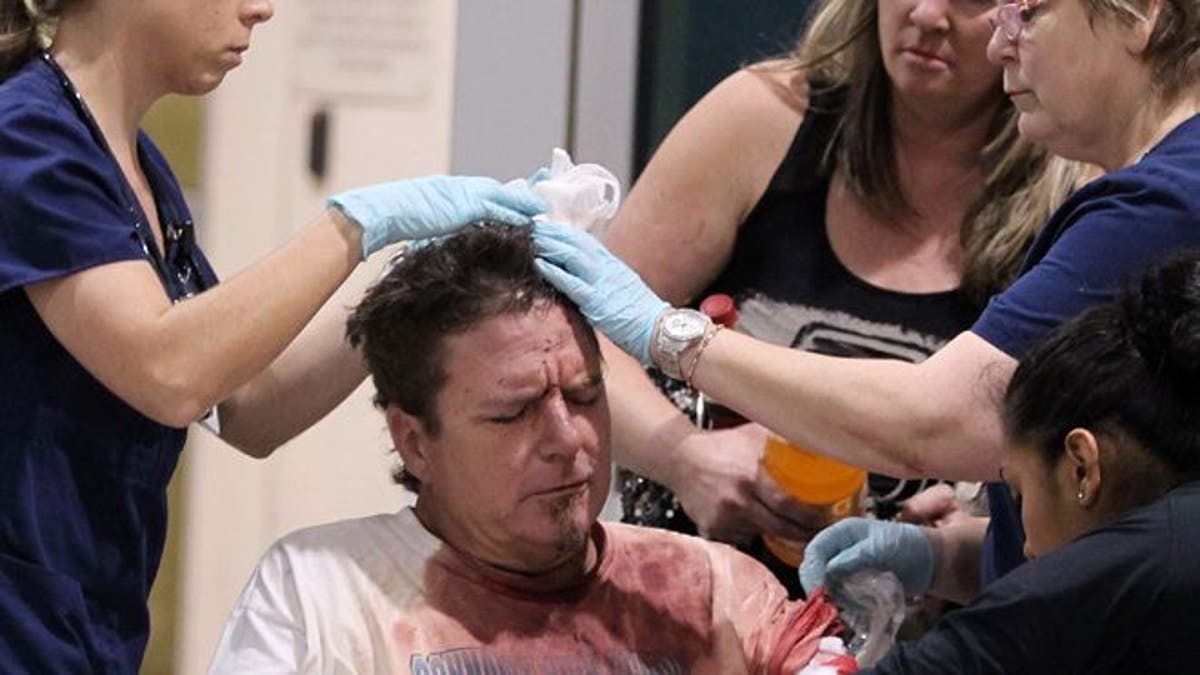
April 17, 2013: An unidentified man injured by the West fertilizer plant explosion is treated by nurses from Hillcrest Baptist Medical Hospital in Waco, Texas. (AP /Waco Tribune Herald)
It was a sunny spring day – April 15, 2013 – when explosions rocked the finish line of the Boston Marathon, killing three and injuring more than 170, with some needing traumatic limb amputations.
It was a quiet night – April 17, 2013 – in the tiny town of West, Texas, when a fertilizer plant exploded, the blast felt 50 miles away. This explosion has killed an unknown number of people, leveled homes and businesses. Rescue workers are missing, and more than 100 people are injured, with bad burns, which could perhaps lead to disfigurement.
How do people go on, waking up one day, with concerns as beautifully and poetically mundane as getting the grocery shopping done or the kids off to school, then ending the day with a lost limb or a lost loved one? After the medical healing is done, how is the psyche restored?
The short answer is that people are stories, and that even very dark and seemingly disabling chapters of those stories can be woven by their self-reliance and the love of others into a cohesive, courageous, successful whole.
This ability to heal is innate our species, and one of the reasons human beings are, ultimately, so inspiring and so worthy.
There is a longer story, however, to this healing. And it often involves the healing arts of others and the tools of modern psychiatry.
Helping someone heal after sudden tragedy first requires being an empathetic witness to that tragedy—hearing them out, with all their shock and fear and rage—so that they will not believe that what they have lived through, are living through, perhaps, and must live with is too horrible to be spoken.
Putting words to what seems beyond words, and “beyond all commiseration,” as the Russian novelist Maxim Gorky wrote, heals. We will never know why.
It is what the great philosopher Martin Buber wrote of in his classic work I and Thou—the spiritual, psychological magic that happens when the boundaries between human beings dissolve.
Anyone who cares deeply for another person can be the medium for such healing, but psychotherapists make a profession of it. And the best of us make of it an art.
It is also true that communing with others (sometimes in gatherings, sometimes in group therapy) who have suffered through similar events can neutralize some of the sense of isolation that grips people when they feel that what has happened to them places them beyond the reach of any common experience. Seeing that others have not only survived, but become strong again—or even stronger than ever—really does awaken healing power in the person struggling with injuries of mind or body or both.
While psychiatric medicines are often maligned (and needlessly so), they can be extremely helpful after trauma. Sleep medicines can help the nervous system rest, when sleeplessness would be the enemy of healing. Anti-anxiety medicines can blunt the aftershock of sudden tragedy. Antidepressants can help restore the flow of chemical messengers that have been stymied, through brain pathways that might, otherwise, have been damaged, forever.
At times that seem unthinkable, unspeakable and unfathomable, the antidote is understanding, sharing, listening and using those tools that help blunt the aftershock, while knowing that everything we need to heal was inside us from our very beginning.
